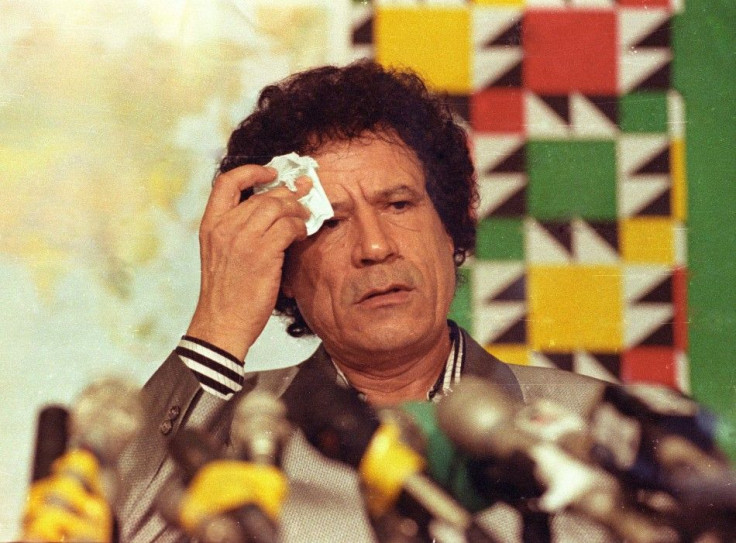Moammar Gadhafi: The Libyan Leader's Defining Moments
As his 42-year Reign Teeters on the Edge, a Look Back at the Polarizing Colonel

In Libya, rebel fighters are ruthlessly hunting Moammar Gadhafi, the man who 42 years ago overthrew King Idris in the name of genuine democracy in a bloodless coup.
With anti-government fighters now battling for control of Tripoli, a new government, one recognized by many world powers, including the United States, France and Italy, is speaking for the Libyan people. The National Transitional Council says it wants Gadhafi, either dead or alive, and is willing to pay for him with immunity and with cash.
How did the Brother Leader, who in recent years befriended global leaders like Silvio Berlusconi, Tony Blair and even Donald Trump, find himself hidden in a secret bunker (if indeed that's where he is) somewhere in the nation he claims to still control?
- Rise to Power -
In September 1969, Gadhafi and a group of military officers wrestled power from King Idris I in a bloodless coup, abolishing the Kingdom of Libya and the constitution and creating the Libyan Arab Republic. (Idris was out of the country at the time)
The 27-year-old, who had been raised in a Bedouin tent in the desert outside of Sirte, was now the leader of Libya.
Under the banner of freedom, socialism, and unity, Gadhafi built a government based on Arab nationalism and anti-Western ideals. He quickly made allies with Egyptian President Gamal Abdel Nasser and later with Syrian President Hafez al-Assad. He ordered American and British forces to leave military bases in the country, and expelled Italian citizens from Libya.
- The Green Book -
The first edition of Gaddafi's three-part political philosophy text was published in 1975. Broken into sections titled The Solution of the Problem of Democracy, The Solution of the Economic Problem: Socialism and The Social Basis of the Third International Theory, the Green Book rejects the ideas of parliament, political parties and the democratic majority in exchange for direct democracy and popular committees.
The most tyrannical dictatorships the world has known have existed under the aegis of parliaments, he writes in the first book.
It quickly became required reading for all Libyans.
- Terrorism -
In the 1980s, Libya was allegedly responsible a number of terrorist attacks on the West. Most famously, Gadhafi accepted responsibility for the Lockerbie bombing. In December 1988, 270 people died when Pan Am Flight 103 exploded over Lockerbie, Scotland. Libya agreed to pay $2.7 billion in damages in 2003.
Libyan citizens were also blamed for other bombings, including a 1980 attack on a dance club in West Berlin and the bombing of a French UTA airliner over Niger, which killed 170 people.
- Diplomacy -
Over the last decade, Gadhafi made amends with many Western nations. U.S. politicians visited Libya for the first time under Gadhafi's authority in 2004, and later that year President George W. Bush ended the Libyan trade embargo. Two years later, the United States restored its full diplomatic ties with the country, while British Prime Minister Tony Blair also visited Gadhafi.
In 2008, Italy compensated Libya with $5 billion for its practices during its colonial rule in first half of the 20th century. Gadhafi and Prime Minister Silvio Berlusconi became famous friends in the years that followed, and Gadhafi went on 11 state visits to Italy, in part to admire the women.
His international friendliness didn't mean that Gadhafi's views had changed entirely. In 2009, Gadhafi made his first-ever address to the United Nations General Assembly, a 90-minute speech that was described as a rambling diatribe by the New York Times. In the harangue, he called the Security Council the terror council and labeled it political feudalism for those who have a permanent seat.”
- 2011 Uprising -
A popular uprising against Gadhafi began in February. Protests turned violent when Gadhafi and his son Saif al-Islam allegedly ordered troops to shoot unarmed demonstrators. Since then, a militant rebel movement, which got NATO backing in April, has swept across Libya. Rebel fighters invaded Tripoli over the weekend, where they are now fighting pro-Gadhafi forces for control of a number of strategic locations, including Gadhafi's Bab Al-Aziziya compound and the Tripoli International Airport.
The perpetually defiant Gadhafi is still boisterously defending himself and his nation, even from a secret a hiding spot. On Wednesday, Gadhafi gave a televised address on al-Uruba TV, in which he said volunteer fighters are driving back rebels across the country. In the speech, he claimed that he had simply walked out of his Tripoli home for tactical reasons, then talked with young people on the street.
He insisted that the fight is not over, and on that point he may be right. After rebels easily took over key areas of Tripoli, loyalists have fought back with an unexpected fury.
Whatever the end result, whether it is, as promised, victory or martyrdom, the world anxiously awaits for Gadhafi to surface.
© Copyright IBTimes 2024. All rights reserved.





















